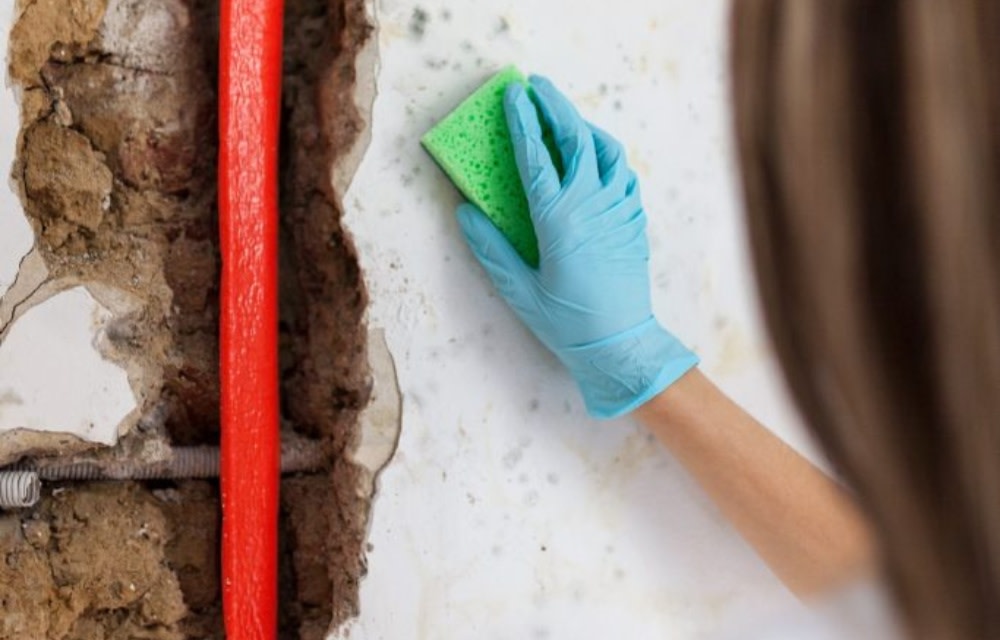
Mold Damage: Does Home Insurance Help?
TABLE OF CONTENTS
Questions, Answered:
Spoiler alert: mold grows on more than bread and cheese. If you have a water leak or live in a humid climate, you might also see mold growing on the walls of your home. And unfortunately, that’s a problem you may have to pay out-of-pocket to fix. While there are exceptions, most homeowner's policies don’t pay to remove mold that is caused by general dampness, old leaks, or normal wear and tear. Usually, your homeowner's insurance will only fund mold removal when the mold was caused by an incident that’s specifically covered in your policy.
To break that down more, your insurer needs to know the cause of the mold before it can make a decision on the claim. If the cause is persistent moisture in your basement, a leaky faucet you never fixed, or faulty work done by a contractor, your insurer won’t pay for the repairs. On the other hand, if the mold arose from an accident that your policy covers, the insurer is more likely to accept the claim.
KEY TAKEAWAYS
- 1
Most homeowners insurance won’t cover mold that arises from humidity, wear and tear, and neglect.
- 2
Your insurer may accept a mold claim if the underlying cause is specifically covered by your policy.
- 3
Homeowners insurance does not normally cover damages relating to flood, including mold.
Covered perils, and why they matter
Accidents covered by a homeowners policy are known as “covered perils.” You should know about perils because they determine the success of any homeowner claim you file, mold-related or otherwise. If you have damages you can prove are caused by a covered peril, your insurer is normally obligated to accept that claim. Damages caused by something other than a covered peril are usually your responsibility to repair.
Common covered perils are fire and smoke, lightning, windstorms, hail, falling objects (like trees), theft, and water damage caused by burst pipes.
Once you realize you have a mold problem, pull out your homeowner's policy and review your covered perils. Pay close attention to the language. Your policy might name the perils that are covered, such as fire or theft. In that case, you will get help on your mold problem if it was caused by one of those perils. But other policies define only the perils that are excluded from coverage. That means your mold problem is covered if the underlying cause is not listed. Confusing, right? Here’s a recap:
A named perils policy lists perils that are covered. If you see fire or theft listed, you probably have a named perils policy. Your mold should be covered if the cause is listed as a covered peril.
An open perils policy defines perils that are excluded from coverage. On these policies, you’ll normally see floods and earthquakes listed as exclusions. Your mold should be covered if the cause is not identified as one of your policy exclusions.
When, specifically, is mold not covered by homeowners insurance?
As noted above, you have to read your insurance policy to understand whether your homeowner's insurance will cover your mold claim. As a rule of thumb, your insurer probably won’t pay for mold that results from negligence, flooding, or humidity.
1. Negligence
Insurance companies don’t pay for damages that result from negligence. So, if you had a chance to fix whatever caused your mold problem, but chose not to, your insurer will likely deny your claim. You’ll also be denied if the mold was caused by a contractor.
This is true even if it seems like a covered peril is in play. For example, your contractor may have failed to protect an area of your home during a hailstorm. If moisture damage and mold result, your insurer may deny the claim — even if hail damage is normally covered. The same could happen if your contractor’s faulty work results in a burst pipe that leads to mold damage.
Here are a few more examples of negligence.
The basement leaks in the winter and you didn’t take steps to waterproof the area or use a humidifier.
Your upstairs shower started leaking after a bathroom remodel.
The bathroom faucet has been dripping for months, but you didn’t repair it.
2. Flood
Flooding is not covered by standard homeowners insurance. If a severe storm leads to flooding in your home, your insurer won’t pay for repairs unless you specifically have a flood policy.
3. Humidity
If you live in Texas or Florida, you’re well aware of how damaging humidity can be to your home and other structures. Unfortunately, your insurer is too. Mold resulting from general humidity normally isn’t covered by your insurance company unless you’ve specifically purchased that type of coverage.
The cost of mold removal and what your insurer will pay
Mold removal usually costs $15 to $30 per square foot. According to HomeGuide.com, most homeowners will pay $1,500 to $3,150 in total to eliminate a mold problem. In extreme cases, where the affected area is very large, the total costs can be $6,000 or more.1
Your homeowner's policy probably limits what can be paid out for mold removal. So, in the case where your insurer accepts your mold claim, you still may be responsible for some of the remediation costs. According to ValuePenguin, homeowners' policies will typically cap mold removal coverage somewhere between $1,000 and $10,000.2 If your mold removal quote is $5,000, but your policy only pays $3,000, you’d be responsible for the remaining $2,000.
What happens when you file a mold claim
If you’ve read your policy and believe you have a valid mold claim, contact your insurer for the next steps. The insurer will ask you for a lot of details, so be prepared to respond. Take photos of the damages and gather up any photos you have of the space before the mold appeared. You should also turn on a dehumidifier in the area to prevent additional mold growth.
Don’t clean up or try to fix any issues on your own. The insurance company will send a claims adjuster to inspect the damages personally and determine the cause. You’ll want that adjuster to see the full extent of the damage.
Homeowners' claims can drag on for weeks. Plan on keeping detailed notes of your conversations with the adjuster and other representatives. Be prepared to follow the insurance company’s process meticulously and also respond quickly to information requests.
Protecting against future mold
There are some steps you can take going forward to minimize the chances of another mold problem. These include:
Fix all leaks as soon as you notice them.
Regularly inspect plumbing in less visible areas, like basements.
Run a dehumidifier in your basement or other chronically damp areas.
Use exhaust fans in bathrooms and kitchens.
Regularly check window seals and reseal as needed.
Mold isn’t just ugly. It’s bad for you and expensive to fix. Protect your health and your wallet by keeping your home as dry as possible. If you do have an accident that leads to mold, turn on your humidifier and contact your insurer right away.
- 2021 mold removal cost: Mold remediation cost per square foot. (n.d.). Retrieved December 14, 2020, from https://homeguide.com/costs/mold-removal-cost
- Caughill, D. (2020, October 01). When does home insurance cover mold? Retrieved December 14, 2020, from https://www.valuepenguin.com/does-homeowners-insurance-cover-mold
TABLE OF CONTENTS


Trying to find the best insurance?
We'll help you find the policy that offers the best value for your situation.
Further Reading

Navigating the Digital Insurance Landscape Considerations
A look at the immense value and high customer lifetime potential within the insurance sector.
Read article

When is Term Life Insurance Worth it?
Decide if term life's advantages are worth it: compare whole vs term life insurance, assess top term providers, and delve into in-depth reviews.
Read article

Insurance Binder: Bridging Between Coverage and Confirmation
From car loans to rental properties, insurance binders are required in a variety of situations. Discover the ins and outs of these essential documents.
Read article

Haven Life Review: Providing Prudent and Protective Policies
Uncover the benefits and drawbacks of Haven Life's term insurance policies, along with eligibility details, pricing, and customer feedback..
Read article
Start Comparing Quotes
Search from our learning center to learn everything from how to easily switch your car insurance to the ins and outs of home insurance.
Fill out just one form and get multiple quotes!


